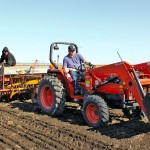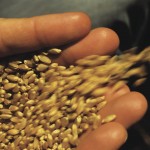
Good yields still possible with crops seeded soon
MAFRD's tips to mitigate the impact of delayed seeding

FLAX: Making a comeback, but seed is tight
Canada’s flax industry is slowly recovering from the damage caused by contamination from CDC Triffid

KAP says do homework before selling grain to unfamiliar buyers
History shows sometimes even trusted companies burn farmers

Canada’s wheat customers following registration system debate

Wheat recommending committee used new procedures at annual meeting
Outgoing chair Brian Beres says the changes, the result of member consensus, streamline the wheat registration process and make it more transparent
2014 spring seeding off to a slow start
The first above normal temperature day this season sees farmers take to the fields

Value of Canadian farmland rises 22 per cent
The increase driven by low interest rates and strong crop prices is the biggest in three decades

Doubling of food needs tied to poverty reduction
Cargill’s Greg Page says a 100 per cent increase in food production is doable, but it requires work, including more scientific research

The $10-billion ‘problem’ Canada likes to have
Last year’s record crop is a sign of bigger things to come, industry leaders say
Canada’s grain system increasing its capacity
Millions of dollars are being invested in country elevators and port terminals to handle the West’s growing crop production


